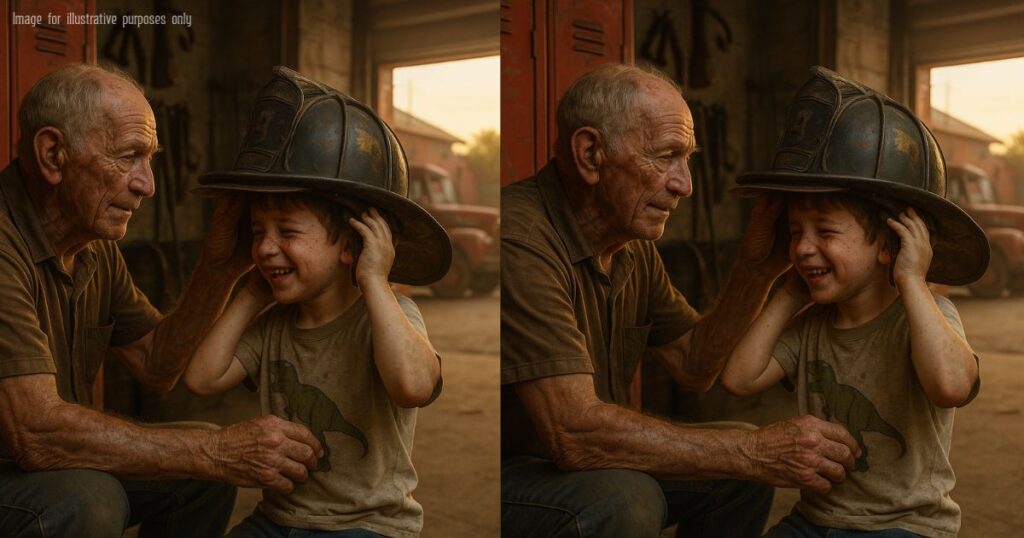The boy knocked over the helmet before he ever asked what it meant to wear one.
It clattered on the floor of the old firehouse like a gunshot, sending echoes across the steel lockers and rusted hooks. Dust floated in sunbeams that hadn’t moved since 1983. Everything smelled like old rubber, diesel, and ghosts.
Frank Caldwell winced but didn’t yell.
“Easy there, Mason,” he said, lowering himself onto the bench with the quiet grunt of someone whose knees had answered too many alarms.
The boy looked up, wide-eyed. He couldn’t have been more than eight. Freckles across his nose. A loose T-shirt with a dinosaur that glowed in the dark. He picked up the helmet carefully this time, holding it like it was made of glass.
“Did you wear this?” he asked.
Frank nodded, leaning forward to rest his forearms on his thighs.
“Every damn day.”
They were alone in the station now. Ladder 9 had been decommissioned fifteen years ago. The city built a new firehouse with sliding glass doors and fancy lockers where everything looked like it had been designed by an architect, not lived in. But this old one—this was where men became firemen, and where Frank Caldwell buried more of his brothers than he cared to count.
He hadn’t been back since he retired. Not until today.
Not until Mason asked what a fireman really did.
The kid was bored on summer break. Frank’s daughter worked double shifts at the hospital now—nurse, single mom, backbone of the family. So Frank picked Mason up in the mornings, made pancakes that were too crispy, and tried to explain why cartoons used to be better when they came on just once a week.
But today was different. Today, he brought Mason to see the real deal.
While Mason ran his fingers along the blackened axe handles and the heavy canvas coats, Frank took out a rag and began wiping down the old breathing masks. They’d grown brittle with age, leather straps curling like dead leaves.
“You ever scared?” Mason asked.
Frank paused.
He thought about the day the orphanage caught fire in ’87. The kids screaming at the windows. The rookie who froze up. The old man who didn’t make it out.
He nodded.
“Every time that bell rang.”
Mason didn’t speak for a while. Then he picked up the firehose nozzle and tried to lift it.
“This thing’s heavy!”
Frank chuckled. “You should’ve seen it when it was full of water.”
Outside, the neighborhood had changed. Where there used to be a bakery and a shoe repair shop, there was a vape store and some place that sold nothing but dog treats shaped like macarons.
The hydrant on the corner still had the dent from when Tommy Parks backed the truck into it on his last day before retirement. Frank had covered for him. That’s what brothers did.
Mason pressed his hand against the locker marked “Caldwell.” The paint was chipped. Inside was a photo of a woman in a nurse’s uniform from 1972—Frank’s wife, gone five years now. And a wrinkled thank-you note in crayon, written by a boy who’d almost died of smoke inhalation in 1994.
The kid stared at the note.
“Is that real?”
Frank took it from the locker and unfolded it gently.
“Yeah. His name was Jason. Pulled him out of a burning apartment in South Elm. He’s probably in his thirties now.”
“You saved him?”
Frank hesitated, then nodded once.
“That’s what we did.”
Later, they sat on the tail of the old engine. Frank reached into his cooler and pulled out two bottles of root beer—one glass, one plastic.
“Back in the day, this was all we drank after a fire. That and black coffee so thick your spoon stood up straight.”
Mason popped the cap off. He looked at the ladder that stretched up to the rafters and back down into history.
“Did you ever drop anybody?”
Frank looked away.
There it was. The question no one ever wanted to ask.
“I tried not to,” he said softly. “But sometimes… sometimes you can’t save everyone.”
Mason sipped his root beer. “But you tried?”
“Every damn time.”
They stayed till the sun dropped low. Light filtered through the bay doors like liquid amber. Dust danced on the floor. The silence of the place wrapped around them like a blanket, warm and heavy.
Before they left, Frank placed his old helmet on the boy’s head. It sank down past his ears.
“It’s too big,” Mason said, laughing.
“You’ll grow into it,” Frank replied.
As they walked to the truck, Mason turned back toward the building. “Papa?”
“Yeah?”
“Are firemen like superheroes?”
Frank stopped, squinting into the dying light. The question hit him harder than the helmet had.
He knelt slowly so they were eye to eye.
“No, son,” he said. “Superheroes wear capes and save the world. Firemen just show up when it’s burning and do what needs doing.”
Mason thought about that. Then he hugged him hard—tight, fierce, the way little boys do when they’re trying not to cry but don’t know why.
Frank held on.
Maybe it wasn’t about saving everyone. Maybe it was about teaching the next ones to try.
And long after they drove away, the old firehouse stood quiet — but somewhere inside, the echo of boots running toward smoke still lingered in the dust.


